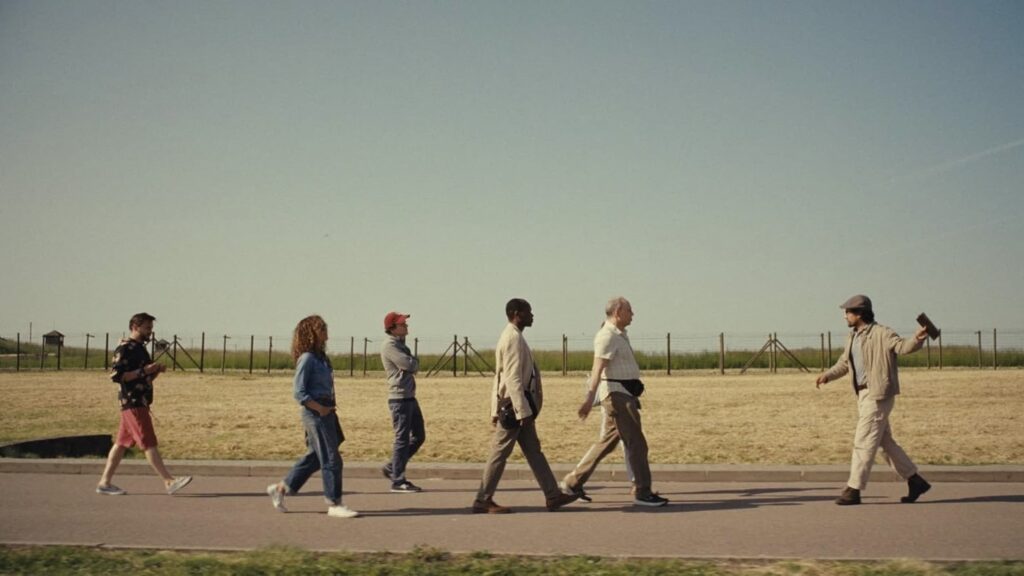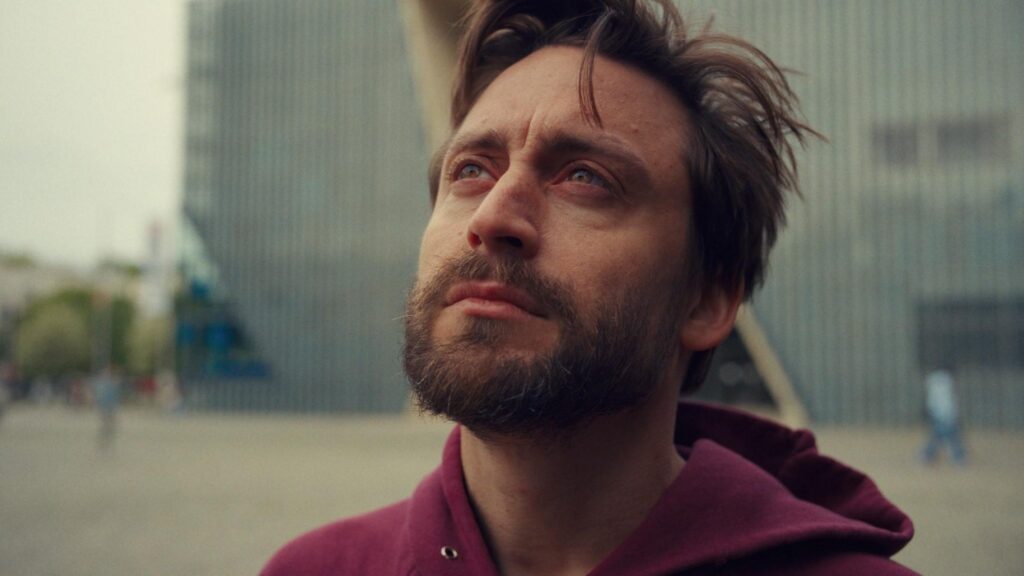Adventure(Po)land
In some of his press interviews for A Real Pain, Jesse Eisenberg reveals that some constructive feedback he received on his first film, When You Finish Saving the World, was that his characters were too closed off to the audience. The audience had to work too hard to crack the characters and story open. I completely disagree. I don’t consider myself an especially smart or savvy movie viewer, and yet I had no trouble appreciating the various neuroses and motivations, obvious and subtle, of the characters in When You Finish Saving the World. Maybe I’m just dramedy-brained, but I found that film perfectly accessible and well-calibrated in its cringe-inducing narrative tone.
A Real Pain swings too hard the other way. It’s the problem that Nate brought up in his comment about Hit Man: We don’t need characters narrating a film’s themes. Eisenberg, co-starring as David, has a scene where he explains to a group of people what makes his cousin Benji (Kieran Culkin) tick: He’s an unfiltered whirlwind (a real pain), but underneath it all, he has a big heart that’s really aching (a real pain). WOW! If only you’d spent the last hour showing us that exactly, Mr. Eisenberg!?
Compare that to the absolutely terrific scene earlier in the film where Benji poses with a statue and ropes in the rest of the tourist group while David awkwardly stands taking pictures. It’s funny, it’s uncomfortable, it tells us a lot about both leads, and nobody states aloud that the moment reveals the double-sided nature of Benji’s whimsical life philosophy: spontaneous moments of engagement with the world around him couple with a narcissistic obliviousness of other people’s boundaries.

That step backwards in audience trust is one of the few negative things I have to say about A Real Pain, which is otherwise one of the standout dramedies of the year. We follow David and Benji during a trip to Poland to see some Holocaust memorials, as well as the childhood home of their grandmother. This mix of normalcy — routine, rehearsed travel tourism — with grief both narrow and monnumental — the passing of a grandparent, The Holocaust — could easily have been cloying or overcooked, but it isn’t. A Real Pain treads a perfect tone: it has a delicate touch that’s neither too comic nor too dreary. The scenario illuminates character struggles and contradictions, especially the contrast between David and Benji who we repeatedly hear were so similar when they were younger.
I also have to admit that this film made me engage with the historical fact of the Holocaust in more affecting ways that other, more dramatic films on the subject have, including The Zone of Interest. The close sequencing of David and Benji first viewing the museum exhibit of shoes of gas chamber victims as Culkin breaks down crying, shortly before the extremely ordinary visit to their grandmother’s childhood house and encounter with a neighbor, crystallizes a bunch of powerful ideas. Societal and cultural tragedy eventually heals back into routine, transactional daily life whether or not we comprehend it. Every pair of shoes had a person who walked in them, and each of those people had a doorstep and a grumpy old man living across the street. That old man was once a confused young adult like David and Benji; and he was lucky enough to survive long enough to grumble at the tourists.
A Real Pain renders a very specific kind of Jewish identity, especially for David. Eisenberg displays a stereotypically New York Jewishness complete with a Woody Allen-esque neurosis, but sanded down and colored as “functional” and “closed off.” His Jewishness isn’t the most dominant identity of his life (being a dad is), but he is still recognizably rooted in the Jewish secular culture. David medicates for OCD throughout the film, amplifying the sense that he has steered away from his dark and complex impulses, the kind that drive Benji. Could their difference in demeanor really be as simple as David popping a daily pill?
The film is remarkably attractive for the genre. Of course, this kind of Sundance-core slice of life has notoriously low standards in visual profile, so take that as a slight backhanded compliment. But Eisenberg and co., including cinematographer Michal Dymek who is a rising talent in European cinema, deploy some lovely lighting and coloring. The photography in Poland is deeply inviting. One friend pointed out that the Polish tourism industry helped fund filming, and they get their money’s worth: I definitely imagined myself going on this tour as I watched, and I have no family or cultural connection to Polish Judaism.

The supporting cast is strong as well. Will Sharpe of The White Lotus is great as a not-quite-smarmy tour guide, and Jennifer Grey is a treat as a fellow tourgoer caught between nursing her own pain and humoring Benji. But the show really belongs to Culkin and Eisenberg. If you’ve ever been unsure of Eisenberg as an actor (full disclosure: I’ve always been sure), then this is a definite notch in the “success” column. Although he sells the big moments and breakdowns well, it’s the subtle stuff that really shines: the glances and hesitations are what color David’s personality.
Of course, awards bodies are giving Culkin the lion’s share of the attention, and he deserves it. I find the character to be a bit uneven in the writing, especially as it comes to overplaying his psychology and overexplaining his feelings, but he’s just wonderful in execution. I’ve only seen a bit of Succession so I can’t use that as evidence, but A Real Pain makes a case that Culkin is a world-class talent in both comic and dramatic acting; and, to the benefit of A Real Pain, in blending those modes. He’ll be among my end-of-year acting honorees.
There is a slight sense of deflation in the film’s ending, a purposeful anti-climax and notion of “so what now” that the film doesn’t quite navigate. The film’s best scenes, like a wander through a street market where Culkin purchases a silly hat as a hysterical juxtaposition to the serious content of the conversation, are interspersed throughout the runtime in an even blend with the merely good ones. It’s not like Aftersun, which builds to a finale where all the cresting emotions come together. But even among the just-fine scenes, almost none of them are bad. A Real Pain doesn’t quite make it into the dramedy annals, but it’s a major success, a showcase for a phenomenal performance, and one of my favorite films of the year.
Is It Good?
Very Good (6/8)
Awards, Honors, & Rankings
- The B.A.D.S. (2024) - Best Screenplay (Nominee)
- The B.A.D.S. (2024) - Best Production Design (Nominee)
- The B.A.D.S. (2024) - Best Actor (Kieran Culkin) (Nominee)
- Top 10 Movies of 2024 - #6
Dan is the founder and head critic of The Goods. Follow Dan on Letterboxd. Join the Discord for updates and discussion.

